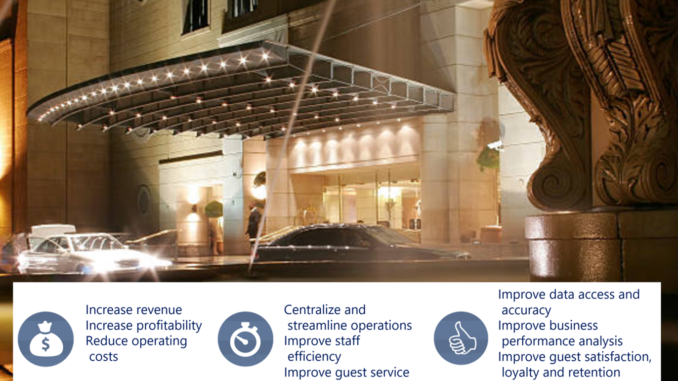
By Jeff Zabin, Managing Editor
Hoteliers today face a number of formidable challenges, from the rapid ascent of Airbnb to the onerous pricing structures inflicted by the OTAs. Increasingly, these challenges are impinging on revenues and profitability.
Hoteliers must also contend with the shifting behaviors and always-on technology expectations of millennials. In fact, guests as a whole are becoming more and more demanding of technology-enabled services, particularly mobile self-service. They want to update their guest profile and account info. They want to order hotel services, message the front desk, and set and monitor housekeeping status. In short, they want to be in control.
Guests also want more from hotels than just a comfortable place to stay; they want memorable experiences tailored to their specific wants and needs.
Given all this, it’s no wonder that hoteliers are seeking to leverage the benefits of next-generation technologies to their advantage.
According to new Starfleet Research, the vast majority of hoteliers believe that these technologies are key to not only addressing many of their current challenges, but also to catapulting their businesses to ever-higher levels of operational performance and guest satisfaction on an ongoing basis.
At the forefront of these technologies is the property management system (PMS). While hardly a new technology — virtually every hotel under the sun has had a PMS of some kind in place for decades — these solutions have evolved by leaps and bounds in recent years, almost beyond the point of recognition.
Technology innovation, driven largely by the advent of cloud hosting and advances in software interoperability and data integration, now enables hotels to centrally manage, track, analyze and optimize the constant flow of information across all parts of the property, with the PMS serving as the command-and-control center.
According to the research, nearly one-quarter (23 per cent) of hoteliers who have not upgraded their PMS within the past three years plan to do so in the next 12 months.
Today, next-generation hospitality technologies are empowering hoteliers with the ability to drive ever-increasing levels of efficiency and effectiveness in their operations, including ever-improving levels of guest service, unlike ever before. As part of their technology modernization process, hoteliers are phasing out function-specific, standalone software programs that are unable to “talk” with one another. In their place hoteliers are deploying technologies that can connect and seamlessly share data.
Combined, these technologies can automate all of the different functions that take place across the property — and, if required, across multiple properties — in a unified and integrated fashion.
With next-generation systems having migrated to the cloud, or having been built natively for the cloud, the grand movement to unify the disparate and fragmented technologies and data siloes that has been underway for years, even decades, is now an achievable goal. Hoteliers are now coming to expect that all of their hospitality solutions, from the central reservations system or channel manager to the revenue management solution to the point of sale (POS) system to the guest response platform to the CRM and guest loyalty applications, will connect and interface and seamlessly share data in the cloud.
According to the new research, 91 percent of hoteliers “agree” or “strongly agree” that technology platform interoperability and compatibility is a key success factor for hotel performance improvement, with the PMS encompassing virtually all aspects of hotel operations.
Different hoteliers will have different expectations of a PMS, based, to a large extent, on the differing requirements of their properties. A full-service hotel will likely require a far more robust and comprehensive system than a small, limited-service hotel, which may need only to automate basic functions like guest bookings, housekeeping, guest charges and maintenance management. A full-service hotel will likely have complex reservation, scheduling and inventory requirements, with a host of features they view as essential to support exceptional guest service. A small, limited-service hotel may have none of these requirements.
All hoteliers need to manage front office, bookings and reservations functions, from assigning guests to rooms and maintaining guest folios to coordinating profile changes, posting room charges and maintaining housekeeping status. Many hoteliers also need to manage concierge and guest services, banquet and conference management, guestroom devices, room maintenance, security management and golf, spa and other facilities management.
The PMS needs to support these capabilities, typically by allowing integration with add-on modules and/or third-party solutions. Having the ability to add any combination of modules, hoteliers can readily create a property- or chain-wide system.
Many systems also integrate with accounting software, keycard and access control systems, self-service kiosks, internet and telephone systems, in-room refreshment (minibar) and entertainment applications, and even, in some cases, dry cleaning, newspaper delivery and transportation shuttles.
The benefits of a next-generation PMS are multifold. Streamlining operations across the organization and providing better management controls should lead to increased staff efficiency and reduce operational costs. Enhancing Guest Relationship Management capabilities should improve guest satisfaction, loyalty and retention. These improvements should be reflected in increased RevPAR and profitability.Better data integration and accuracy should improve revenue management and channel management capabilities, also translating into favorable financial outcomes.
